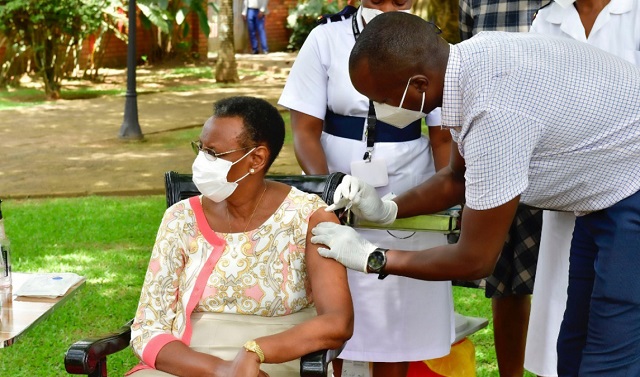
95% of Ugandans interviewed in January expected pandemic to get serious in June
Kampala, Uganda | RONALD MUSOKE | As President Yoweri Museveni mulls over the idea of forcing Ugandans into another lockdown to contain a resurging and more virulent Coronavirus, which has infected over 5,000 people in days, it appears majority of Ugandans do not approve, according to findings from a survey done by the pan-African polling firm, Afrobarometer.
The Independent understands the Ministry of Health technocrats have proposed to the president to “seriously consider” a second lockdown of the country to save thousands of Ugandans from dying of COVID-19.
Last month, Dr. Diana Atwine, the Permanent Secretary in the Ministry of Health told the media that the government would consider imposing another lockdown to stem the rising number of cases in Uganda.
“We are experiencing a new wave of COVID-19. We are seeing more young people getting infected. It is no longer a disease of the old people,” she said.
Recent updates of COVID-19 infections suggest Uganda has been hit by a second wave of the pandemic and daily cases are now being registered in thousands compared to the double digits that were being filed at the beginning of this year.
June 01 was particularly devastating. Ministry of Health officials recorded over 1,000 cases out of the 6,283 samples collected and analysed that day. This, they said, was the highest number ever recorded in a single day in Uganda since the pandemic was reported in March, last year. But the next day, June 02, that number rose to 1,247 cases. As of June 03, Uganda had cumulatively tested over 1,300,000 samples for COVID-19, with over 50,000 confirmed cases, 47,760 recoveries and 365 deaths.
Tough lockdown
But, the Afrobarometer survey report titled: “Caution or Apathy? Mixed views on government response to COVID-19 in Uganda,” which was released on June 04 in Kampala notes that while the majority of Ugandans last year approved of the government’s management of the response to the COVID-19 pandemic, including the lockdown and closure of schools, they also found it difficult to comply with the restrictions.
The survey was conducted between Dec.22, last year and Jan.07, this year, across 110 of the 135 districts of Uganda by researchers from Hatchile Consult, the administrators of Afrobarometer’s polls in Uganda. They sampled 2,400 randomly selected adult citizens.
Although about nine in 10 (89%) “agreed” or “strongly agreed” that the lockdown was necessary, in spite of the toll it took on the economy and people’s livelihoods, two-thirds (67%) said they found it “difficult” or “very difficult” to comply with the restrictions or curfews imposed.
The youth (73%) particularly found complying with the COVID-19 restrictions hard followed by those aged 31-49. The men (68%) said they found compliance with the restrictions hard. People living in poverty (80%) said they found compliance quite hard compared to those who are relatively wealthy (53%).
Regionally, people in northern Uganda (86%) found compliance hardest followed by those from eastern Uganda (74%). People living in western Uganda found compliance comparatively easy (50%).
Asked if they personally or any other member of their household had recently got ill with COVID-19, three percent said they had actually either fallen ill or one of their household members had done so. That would imply that close to 1.2 million Ugandans could have fallen ill during the first wave of the COVID-19 pandemic.
The respondents were also asked if they or any one in their household had temporarily or permanently lost a job, business or primary source of income and,about 55% said they had lost income or an income source due to COVID-19.
Those who reported loss of income were highest in towns (63%). The pandemic also hit harder the most educated (those with post secondary qualifications) (67%) while those with no formal education were least affected.
The youth (18-30 years) also came off worst while people living and working in central Uganda were the most affected followed by those who live and work in western Uganda. People who live and work in eastern Uganda were the least affected.
As far as the government response to the pandemic is concerned,Ugandans overwhelmingly (82%) say the government managed “fairly well” or “very well” its response to the pandemic.
More than eight in 10 Ugandans (82%) say the government has managed its response to the COVID-19 pandemic “fairly well” or “very well.” But about the same proportion (81%) believe that “somewhat” or “a lot” of the resources available for responding to the pandemic were lost to corruption among government officials.
When asked if either they or any member of their household received any assistance from government, like food, cash payments, relief from bill payments, or other assistance that they were not normally receiving before the pandemic,only two in 10 Ugandans (19%) say they or their households received government assistance during the pandemic.
Three-fourths (75%) say the distribution of the government relief package to support citizens during the COVID-19 pandemic was not done fairly. When asked how well or badly they thought the government has managed the response to the COVID-19 pandemic, eight in 10 Ugandans (81%) said the government officials had misused “some” or “a lot” of resources made available for COVID-19 through corruption.
Following a report by the Auditor General in March, this year, which revealed significant mismanagement of COVID-19 funds, the respondents were asked how much they thought of the funds made available to the government for combating and responding to the pandemic had been already lost or stolen due to corruption among government officials. Nearly eight in 10 Ugandans (77%) worry about public servants and politicians using the pandemic to enrich themselves economically, or increase their power and authority (71%).
 The Independent Uganda: You get the Truth we Pay the Price
The Independent Uganda: You get the Truth we Pay the Price



